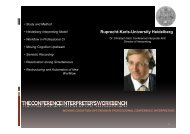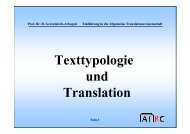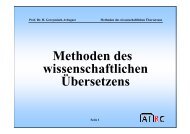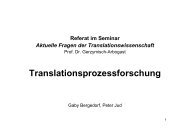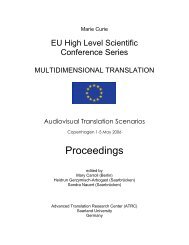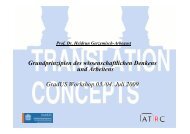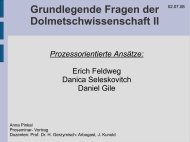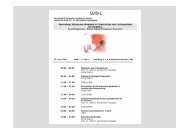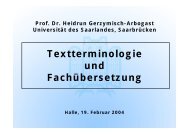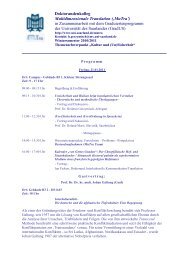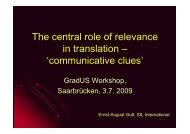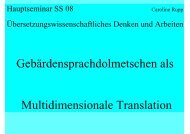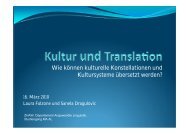Proceedings - Translation Concepts
Proceedings - Translation Concepts
Proceedings - Translation Concepts
Create successful ePaper yourself
Turn your PDF publications into a flip-book with our unique Google optimized e-Paper software.
MuTra 2005 – Challenges of Multidimensional <strong>Translation</strong>: Conference <strong>Proceedings</strong><br />
Nilgin Tanis Polat<br />
be translated as: Look how this damned thing doesn’t even burn properly! Do you think she<br />
will care about the guys running around or the ones standing erect within the smoke!<br />
Furthermore, in Turkish, emotions are supported with gestures more generously than in<br />
German. For instance, in the first chapter of the novel Yer Demir Gök Bakır, the hands of<br />
Hasan and Ummuhan touch one another for six times – this is stressed by the narrator. In<br />
Blechtrommel, gestures and facial expressions appear to be subordinate or auxiliary to speech.<br />
3.3 Routine Formulae<br />
A further characteristic of the Turkish discourse in the analyzed texts is the frequent use of<br />
idiomatic routine formulae with a religious connotation. In the German narrative texts that<br />
were analyzed, those expressions are used more directly. In the first chapter of Yer Demir Gök<br />
Bakır, examples of idioms are: “Yoldaş olma namussuza, arsıza. Akıbet başına bela getirir.”<br />
(Don’t ever be a companion to the dishonourable and shameless, or else you’ll get into trouble<br />
in the end); “Yalnız git, yoldaş olma yüzsüze” (Go by yourself and don’t be a companion to<br />
the impudent); “Erkek olmayanın yalanı çoktur” (Those who are not man do lie a lot);<br />
“Orospuda iman olmaz, din olmaz.” (Whores do not have neither faith nor religion).<br />
In particular, religious expressions like “kurban olayım” (do sacrifice me), “Allahın<br />
belası kuş” (God damn bird), “Vallahi billahi söylemem” (I swear to God I will not say it to<br />
anybody) are used more frequently in Turkish than in German narrative texts.<br />
The following example shows that the translator does not hesitate to add idioms in<br />
accordance with the different communicative preferences, although the source text does not<br />
include any:<br />
Zugegeben: ich bin Insasse einer Heil- und Pflegeanstalt, mein Pfleger beobachtet mich, läßt mich<br />
kaum aus dem Auge; denn in der Tür ist ein Guckloch, und meines Pflegers Auge ist von jenem<br />
Braun, welches mich, den Blauäugigen, nicht durchschauen kann. (Grass 1993:9)<br />
Ne yalan söyleyeyim, bir akıl ve ruh hastalıkları kliniğinin sakinlerindenim. Bakıcım göz altında<br />
tutuyor beni, gözlerini üzerimden pek ayırmıyor, çünkü kapıda bir gözetleme penceresi var ve<br />
bakıcımın gözleri o malum kahverengi renkte, ben mavi gözlünün bir türlü içini göremiyor. (Grass<br />
2000:7)<br />
The word “zugegeben” is translated into Turkish with a routine formula, i.e. it is<br />
translated word for word as why should I lie. This routine formula is employed in order to<br />
attract the attention of the addressee and express sympathy. At the same time, this routine<br />
formula arouses a feeling of compassion towards the protagonist, which does not exist in the<br />
German version.<br />
Moreover, also the morphologic structure causes a discrepancy between German and<br />
Turkish. In Turkish, tense and person can be in the verb as suffix. It is left to the speaker<br />
whether subject and time are additionally expressed or not. However, as with the example<br />
“seni seviyorum” the agent of the action is often not overtly told by the pronoun, “I”. Thus,<br />
the language achieves a more dynamic style through the possibility of expressing more with<br />
few words: “vazgeçtim” becomes I changed my mind or “Ummuhanı göremedi” becomes he<br />
could not see Ummuhan. In this respect, thanks to the possibility to convey the subject within<br />
the verb, the narrator does not have to repeat the subject and cause monotony in the flow of<br />
the language. The ’variation field’, allowed in the Turkish text, is missing in German.<br />
Therefore, if the translator additionally utters the pronoun, the meaning is over-stressed and<br />
the subject becomes the central issue of the sentence and causes a distance between the<br />
participants of the conversation. The following excerpt from Blechtrommel shows that the<br />
translator avoids the additional reference to the subject in order not to over-emphasize the<br />
agent:<br />
144



